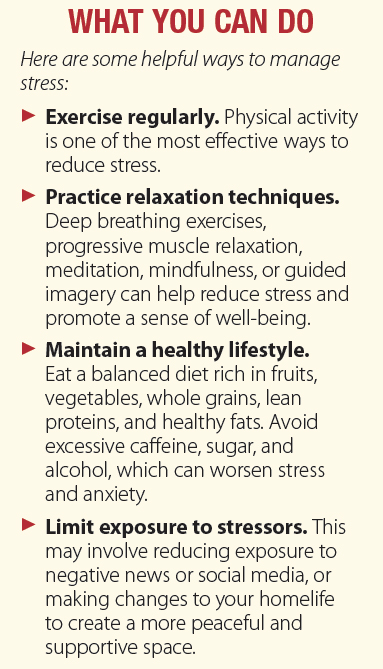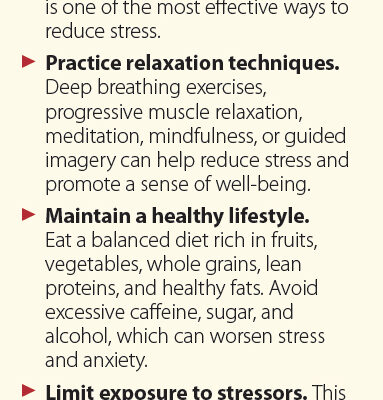Adopt These Coping Strategies so Stress Won’t Make You Sick
Stress is a natural response to challenging situations, and not all stress is harmful. However, chronic or excessive stress can have negative effects on physical and mental health. This is especially true for women who, studies show, are more stressed than men, especially during perimenopause and menopause.
Managing stress through techniques such as relaxation, mindfulness, exercise, social support, and by seeking professional help, when needed, can help reduce its negative impact on health and well-being. Read on to learn about the effects of stress on health and how to reduce stressful influences in your life.
The Hormonal Connection
We tend to associate stress with mental and emotional health, but often overlook the impact that stress can inflict on physical health. “Chronic stress may be associated with overexposure to cortisol and other stress hormones that, over time, can take their toll on physical health and contribute to increased risk for heart disease, digestive problems, depression, memory impairment, and a weakened immune system,” says Susan Evans, PhD, Director of Education in Psychology, Weill Cornell Medicine, Department of Psychiatry.

10 Ways Stress Can Make You Sick
Weakening the immune system: Chronic stress can suppress the immune system, making the body more vulnerable to infections, viruses, and other illnesses.
Inflammation: Stress triggers the release of hormones, such as cortisol and adrenaline, which can promote inflammation. Chronic inflammation is associated with a wide range of health problems, including cardiovascular disease, autoimmune disorders, and digestive issues.
Heart health: Stress can impact the cardiovascular system by raising blood pressure, increasing heart rate, and constricting blood vessels. Chronic stress can contribute to hypertension, heart disease, and stroke.
Digestive problems: Stress can disrupt functioning of the digestive system, leading to stomachaches, diarrhea, constipation, and nausea.
Mental health disorders: Prolonged stress can increase the risk of developing anxiety, depression, and post-traumatic stress disorder.
Sleep disturbances: Stress can interfere with sleep patterns. Chronic sleep disturbances can weaken the immune system, impair cognitive function, and increase the risk of chronic diseases.
Weight gain: Stress can influence eating behaviors and food choices, leading to overeating, emotional eating, or cravings for unhealthy foods high in sugar, fat, and calories. This can lead to obesity and a higher risk of diabetes.
Muscle tension and pain: Stress can cause muscle tension and stiffness, leading to headaches, neck pain, back pain, and other musculoskeletal problems.
Memory impairment: Prolonged stress can result in shrinking of the hippocampus, which is a part of the brain critical to memory.
Pain: Chronic stress can aggravate existing pain conditions such as fibromyalgia or temporomandibular joint disorder.
Adopt Helpful Coping Strategies
Life events such as divorce, retirement, or the death of a loved one can disrupt routines and create stress. Even positive life changes can be accompanied by stress due to the adjustment process. “Women in midlife experience stress that includes significant hormonal fluctuations during menopause, including estrogen depletion. These changes can play havoc on well-being,” says Evans.
Reducing the harmful effects of stress involves adopting healthy coping strategies and lifestyle habits. “When patients present in my practice with physical and emotional symptoms of stress, first I encourage getting sound and adequate sleep—at least seven to eight hours per night. This may be the most important buffer to the effects of stress. I also ask patients to exercise regularly and adopt a healthy and nutritional diet,” says Evans.
If stress is hindering your life, consider professional help. Therapy, counseling, or medication may manage stress and improve your well-being.
The post Adopt These Coping Strategies so Stress Won’t Make You Sick appeared first on University Health News.
Read Original Article: Adopt These Coping Strategies so Stress Won’t Make You Sick »


